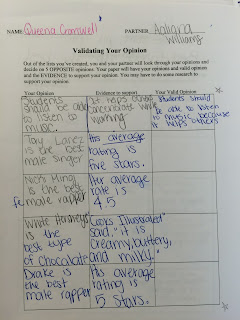Say:
I definitely agree that the nature of arguments are in almost every part of our lives from politics to social interactions. It is important for students to understand that these natural exchanges exist within not only the classroom, but in the world around them. I think it is also important that students understand how much power they have when it comes to mastering the skill of argument; it takes a lot of critical thinking and use of language for someone to really dominate an argument. In my high school experience, I do not recall focusing on argumentative writing besides the stereotypical "pass this part of the writing exam" and now I wish I had a teacher who really stopped and made us analyze how they created the argument. I knew claim and data; however, the book made me think about warrants and how they are essential to the argument. Students make arguments all of the time, but I've definitely noticed that students struggle with finding a strong argument. Even for small literary analysis writings, they fail to think of a strong thesis. I wonder if it would be better to teach certain aspects of writing an argument and incorporate literature so the students can develop not only strong claims, but also strong thesis statements for reading. I also thought it was important for students to understand counterclaims and rebuttals because it shows a high level of thinking. We also teach students about thesis statements, but I think it might be more powerful to really scaffold them into making a thesis statement from a claim. As I work in the classroom, I can see the disconnect for students making strong claims and thesis statements when looking at literature.
I also think the art of argument is important because it teaches students on talking as well as learning through talk. I feel like students need to be able to articulate their claims and evidence so combining what we learned previously about teaching kids to talk and through talking can, structuring arguments by talking would be beneficial to students.
DO:
This 'do' wasn't necessarily planned for argumentative writing, but part of a informational text unit that I was teaching. We went over facts, bias, and opinion, but we also wanted students to understand the difference between opinions and validating your opinion. I came up with an exercise in which we discussed the difference between facts and opinions, but then I asked students to quick write their opinions. Then I put them in a pairs(which I assigned) and the students had to state their opinion about a certain subject(they had choice). They stated different opinions about that subject and had to state their evidence as to why they thought their opinion is more validated. The third box was for their validating opinion statement because I wanted them to get use to stating their opinion along with the evidence to validate it. Once the each group finished, they were able to stand up and state the difference in opinions they had and the evidence they used to support it. The whole class was able to give their opinion as to which partner had the best argument. This group is really talkative and opinionated so it was nice to see them transfer those opinions and we really challenged them to validate their opinion with concrete evidence.

So what methods which encourage talk would you utilize when teaching argument? I am curious--do you think argument could be built into book clubs? Obviously, Socratic circles. What about debate? I agree with you that there is a disconnect--I found students could create arguments with claims but when they tried to make arguments about literature and translate a claim to a thesis, the waters became more muddied. Perhaps we should start simpler--like with "The most important ___" in a text or a review of a book--is not that an argument? Maybe we jump too deeply into literary analysis arguments without scaffolding them enough. Did you take a look at the BB article or resources? I LOVE This Do and find it very applicable to constructing argument.
ReplyDeleteI also did not have any formal training in writing arguments when I was in school. I don't even think I was ever taught what a claim was. This reading was interesting to me because of how it explicitly laid out the parts of the argument that I knew would be there, but just needed them pointed out to me. I like your DO a lot. Differentiating between opinion and facts is an important skill to learn, not only so that students can make their own arguments stronger, but so they can make sure they aren't swayed by a weak argument.
ReplyDelete